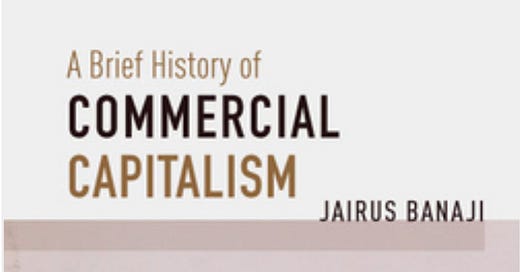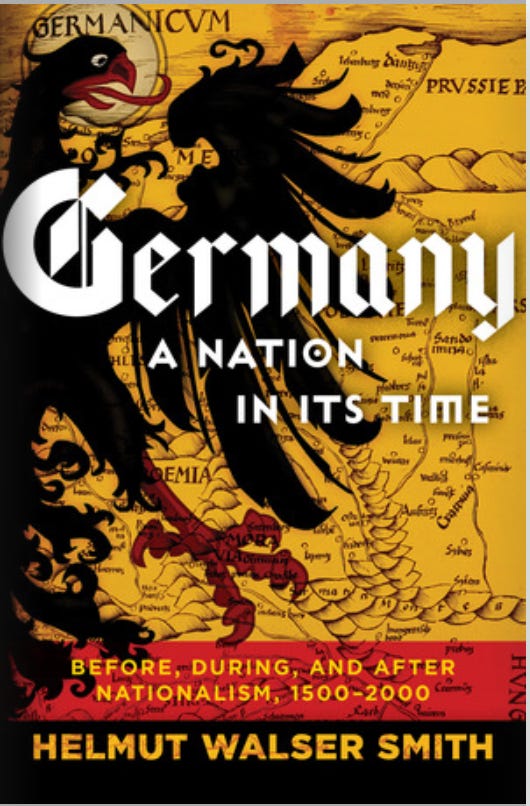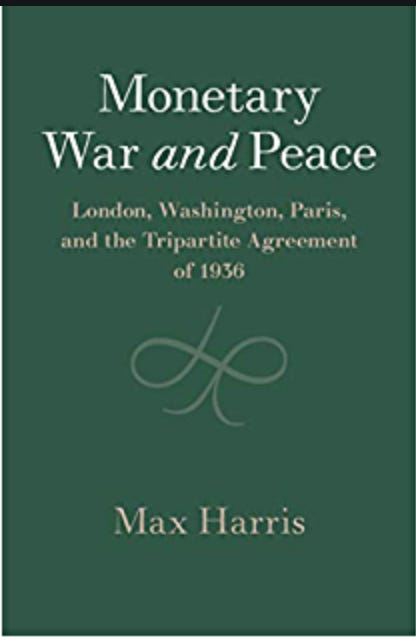Top Links #20 Commercial Capitalism, mapping global urbanism and Bauhaus birthday cake.
Good stuff to read for the weekend.
A fascinating short book: Jairus Banaji on Commercial Capitalism
Earlier this week, I taught Jairus Banaji’s extraordinarily distilled, book-length essay on the deep history of commercial capitalism. Highly recommended. Not for the faint hearted. Buckle up! This book goes from zero to 60 …. fast.
To me Banaji’s book reads not only as a history and as a theoretical statement, but also, intriguingly, as an effort to situate Marxist thinking about the commercial capitalism issue in its historical context. Far from absolutizing an eternal return of commercial capitalism (though it does return), Banaji is making an effort to chart precisely what Marx and others in the tradition could and could not see between the 1850s and the early 1880s.
This is a great passage on that score:
“Marx encountered the advance system of commercial capitalism in its simplest form when he allowed for the theoretical possibility that the advances disbursed by the Bengal Opium Department to the growers of poppy it signed contracts with embodied a circulation of capital.71 The theory of commercial capitalism developed in this book depends to some degree on extending this conception to the numerous trades and businesses where advances were used on a regular basis. The case Marx referred to (in passing, of course) was fairly simple in the sense that essentially it involved only three parties, (1) the government, (2) the cultivators, and (3) the opium merchants and dealers at the “sales” in Calcutta. … In most markets, however, capital circulated through more complex chains that bound a whole battery of mercantile interests at very different levels of the commercial system. None of these chains or “trading machines” was like any other, as the following rapid survey of examples shows. It would be easiest to arrange them by moving consistently east, starting with the Atlantic seaboard of the US, the states of Mississippi and Louisiana which had well over one hundred thousand slaves in the early nineteenth century.”
I find this systematic pluralism extremely inspiring. “None of these machines was like any other” is a really useful starting point. Not to dissolve into meaningless plurality but to start thinking about what the differences consist in and how they are interrelated … “uneven and combined”.
I also particularly appreciate Banaji’s clear demarcation of the end of high commercial capitalism - under auspices of the mid-nineteenth century British empire - and its supersession by a new industrial-imperialist age.
“Finally, patterns of economic domination bound up with the expansion of commercial capital (in the early 19th century British empire) were considerably wider than those of imperial control or straightforward colonialism. In fact, imperialism in the modern sense, that is, the division of the world in Hobsbawm’s Age of Empire (1880–1914), marked a sharp break in the pattern defined by Britain’s centrality in financial, trading, and shipping services. It reflected not the “anarchism of the bourgeoisie,” as Hobsbawm called the liberalism of the nineteenth century179 and the liberal-cosmopolitan order that British commerce had held in place, but the rapid emergence of “national economies” driven more by large-scale industry and “big business” than by trade per se.180 “Imperialism” “was a novel term devised to describe a novel phenomenon.”181 This, if you like, is the point at which trade seriously began to be driven by industry in the sense in which Marx defined this dynamic, that is, as the “subordination of commercial to industrial capital.” If the size of the world’s merchant marine almost doubled between 1890 and 1914, whereas it had only risen from 10 to 16 million tons in 1840–1870,182 during the apogee of British commercial expansion, the expansion of shipping now reflected the humongous demands of the new industrial capitals (American, German, and French as much, or more, than British). As Engels drew closer to the end of his life in the 1890s (he died in 1895), oil, steel, and chemicals, not textiles, became the typical face of large-scale industry. In his addenda to volume three of Capital, Engels’s sense of this new capitalist modernity was reflected in belated references to the surge of competition between “a whole series of competing industrial countries”183 and to “gigantic” concentrations of capital in “cartels” and “trusts.”184 All this was new, anticipated but never witnessed by Marx. But the sense of capitalist novelty was of course also reflected in admiring references to the way submarine telegraph cables, steamers, and the completion of the Suez Canal had all dramatically compressed or accelerated the turnover of world trade. Between the writing of Capital and Engels’s additions to the text a completely new world had emerged, defined by a much sharper sense of nationality, greater aggression in world politics, and a sense of living at new velocities. The concentration of manufacturing capital had major implications for merchants. It allowed for the setting up of company sales offices and company-operated sales networks, and in the US by 1900 “the manufacturer was ascendant, the independent merchant in decline.”185 It also brought about new forms of retail capital in the shape of huge department stores that emerged in metropolises like Paris from the 1870s. Again, velocity of circulation was the driving imperative, with sales volumes running into many millions of francs or dollars and turned over more rapidly thanks to the lower margins that giant retailers were willing to accept.186 In the “Convolutes” Walter Benjamin describes the department stores (magasins de nouveautés) as “temples consecrated to the religious intoxication of great cities,” borrowing part of this striking expression from Baudelaire.187 Advertising was common and extensive by the 1870s,188 and increasingly linked to revolutionary new forms of energy such as electricity189 which lighted up the shopping arcades and department stores. In the spheres where they survived in a substantial way, speed became an ever more essential part of the way commercial capitals had to operate.”
Obviously, this has resonance with some of the arguments in Deluge - the novelty of the problem of “modern imperialism”, the interpretation of 1914 and the question of hegemony that follow from that. More on this to follow in part 2 of the “Long-overdue Response”.
Banaji is a truly remarkable figure - scholar, activist, social researcher. On his trajectory I benefited greatly from two interviews. One in Borderlines. The other in Historical Materialism.
Historical Maps
Helmut Smith of Vanderbilt is one of my favorite German historians. He also has great taste in historical maps.

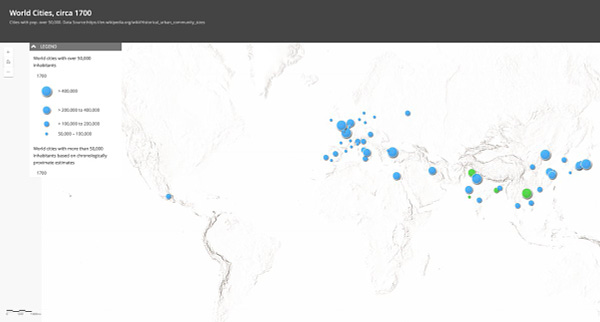
If you have someone in your life who is a European history buff, get them Helmut’s wonderful book about Germany for the holidays!
More from Ladybird Books:
Thanks to Duncan Weldon for pointing out that Penguin has brought back the Ladybird book series. For grown-ups … at least I think they are. Half of them seem to be about World War II. Bit weird …
A book about how the Bay (Area) came to be
Had the great pleasure of doing a radio show this week with Alexis Madrigal who has a truly fascinating book on the backburner about the Bay Area, Oakland and Margaret Gordon, an environmental justice activist in West Oakland. Check out the book description here. VERY cool.
The Tripartite Agreement of 1936
I have long thought the US-UK-France monetary deal in 1936 is one of the most underrated events in interwar geoeconomics. Going to come back to this …
Great to see a new book out about it by Max Harris.
You can get some of the gist in this paper.
Great also to see a fascinating review by my brilliant friend Nick Mulder.
Bauhaus birthday cake

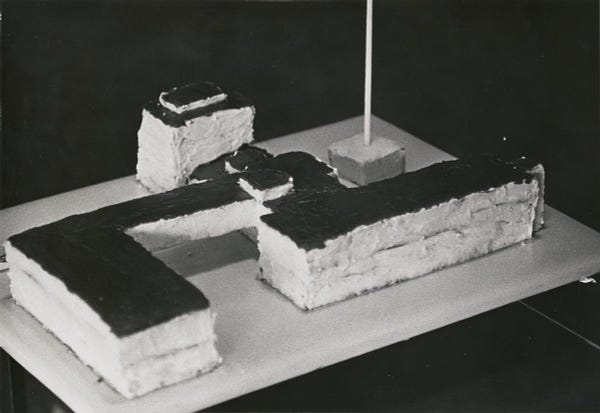
This list normally goes out in full only to subscribers to Chartbook.
There are three options:
The annual subscription: $50 annually
The standard monthly subscription: $5 monthly - which gives you a bit more flexibility.
Founders club:$ 120 annually, or another amount at your discretion - for those who really love Chartbook Newsletter, or read it in a professional setting in which you regularly pay for subscriptions, please consider signing up for the Founders Club.

